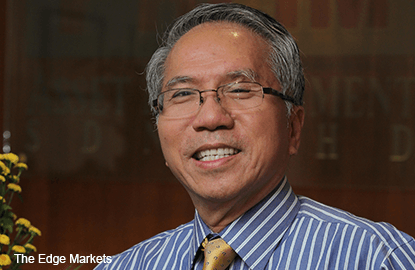
This article first appeared in Personal Wealth, The Edge Malaysia Weekly, on October 19 - 25, 2015.
Don’t be fully invested at all times

TAN began his career at Chung Khiaw Bank in 1975 as a class one relief officer after graduating from Western Illinois University the year before with a post-graduate degree in business administration. “But I found the routine too tedious,” he says.
After working for a commercial bank for almost a year, Tan joined South East Asia Development Corp, then an investment holding company, which set him on the path of fund management. In his fourth year at the company, he landed a job at Arab-Malaysian Merchant Bank as its head of investment services. From there, he went on to work for a number of reputable foreign fund houses until 1994, when he decided set up his own company.
Tan recently published his first book, Rising Above Financial Storms, which focuses on his early years in equity investing. He recalls how Pheim kept its head above water and rode out some of the major crises that hit our shores and gives his advice to investors and fund managers.
Pheim has received numerous accolades for its funds, including one given in 2014-2015 by Beijing-based China Daily, which said “The Pheim Asean Fund has become the World's Best Asean Equity Fund in the category of Asean Equity Funds”. Pheim Malaysia has been profitable for each of the last 21 years since its formation in 1994. So it comes as no surprise that Tan has been able to adapt to countless challenges.
Earlier this year, the Pheim Asean Fund came out tops for all categories — 1-year to 20-year periods — of Equity Asean funds in the Lipper global classification under the International Offshore universe on its 20th anniversary, registering a cumulative return of 497.37% in US dollar terms.
Having survived both the Asian financial crisis and global financial crisis, Tan attributes Pheim’s success to the company’s philosophy of not being fully invested at all times. This has allowed the fund manager to buy into attractively valued companies when the stock market undergoes a correction.
“A fund should be fully invested near the bottom of the market and trimmed near the peak. But it should never be fully invested at all times as Asian markets tend to be volatile, unlike the more developed markets such as the US,” he says.
While many fund managers find that equities in developed markets will outperform emerging markets as a result of the Fed’s tapering, Tan believes this only makes emerging market stocks “more attractive”.
“When the market is at its highest point and you are fully invested, you are hurt badly when the market corrects. It will then take you another one to two years to recover and break even, whereas if you had sold the shares, you would have the cash to buy when the market comes down,” he says.
“The earnings growth — the main factor of a rising stock market — in emerging markets will outperform that of the developed markets in the long run, even though they are facing some short-term hiccups now.”
Tan relates in the book that the funds under Pheim took a beating during the global financial crisis in 2008, but recovered in 2009 and 2010 as the fund house was able to navigate through the turbulent period.
Among the companies that Pheim bought into during the crisis was PT Astra Agro — one of the largest companies listed on the Jakarta Stock Exchange and one of the many affected by the sharp fall in Indonesian stocks in October 2008.
Taking advantage of the market’s weakness, the fund house bought Astra Agro’s shares at IDR4,600 on Oct 28, 2008 — the lowest price ever at that juncture — which Tan attributes to luck, crisis and value investing. As palm oil prices are believed to be cyclical, the price of the shares were considered to be undervalued and were bound to recover, he says.
“My belief was that the crisis period provided a great opportunity and the world demand for vegetable oil, including palm oil, would increase 3% to 5% per annum as soybean oil sells at a premium and palm oil has no trans fat,” Tan says in his book.
He explains that Pheim seeks stocks that are relatively cheap to their underlying value, in the expectation that their price will rise at some point to more accurately reflect their true worth.
“Generally, we seek companies that have a focused management [style], enjoy high margins and earnings growth, have low debt equity gearing, and whose shares trade at a low price-earnings ratio and/or price-to-book ratio,” Tan says.
Save by subscribing to us for your print and/or digital copy.
P/S: The Edge is also available on Apple's AppStore and Androids' Google Play.